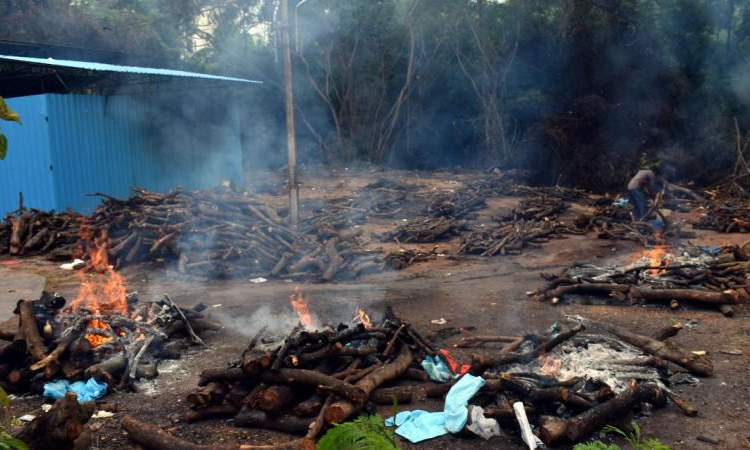The Case For 'Burying' Differences And Upholding Dignity
N.KavithaRameshwar
5 Jan 2022 7:18 PM IST

Picture Courtesy : The New Indian Express
'Man is born alone and dies alone' is the wise counsel of Chanakya but the hard reality is that a man's community status never leaves him alone, not even at death. So much so that some sections of society, and the lowest in the so-called hierarchy of the caste system have to struggle for enforcement of their fundamental right to a decent burial of their bodies on death, which is an integral part of the right to live and die with dignity under Article 21 of the Constitution of India. Some rights are handed down to citizens and persons by the Constitution but there are rights so inherent to human existence and dignity that we are born with them naturally, and are inviolable. The Constitution only guarantees these rights for our meaningful sustenance. It is in this context that one must attempt to view the existing scenario where in almost every other State in India, litigation relating to the right to bury and cremate the dead, or to not allow burial/cremation of persons of other communities in their lands, is sought to be enforced. Whether it is a positive direction or negative relief sought for, depending on who approaches the Court, Courts have always ruefully lamented the state of affairs and the all-pervasive effect and influence that caste continues to have on our lives, even at its ultimate stage. Further, this phenomenon is not peculiar to India, for caste is analogous to race in other countries like USA and UK, where also instances of racial segregation reach graveyards and the situation is as pitiful as they are here.
In the last two decades, the Madras High Court has significantly delved on the issue, starting from T. Balasubramanian v. Commissioner, CDJ 2008 MHC 4223, where the Court held categorically that allotment of a separate cremation yard based upon communities or castes should come to an end. This was followed by the judgment in P. Rathinam v. State of Tamil Nadu, 2009 (6) MLJ 235 (DB), and in the case of P.Joseph Raj v. The District Collector, Dindigul District and 4 others, (judgment dated 16.06.2015) where the Court expressed that it was deeply pained that the case therein involved the relief of prevention of the disposal of dead bodies of a particular religion in water bodies, where it noted that in Paul Thankom v. Secretary to Government, Home Dept. & six others (dated 14.08.2012), it was observed that and is worthy of reproduction once again here that-
''9. Nobody shuns a doctor, or staff or even an employee, who cleans up a patient, in a hospital, on the grounds of caste, creed or religion. Differences though exist, nobody would ever think of it. Blood transfused in a hospital is not segregated on the basis of caste, creed or religion. Nor the person who requires blood, would ever demand blood only from a person belonging to his caste, community, creed or religion. If for his survival and existence a person can consciously believe and accept that all are equal, irrespective of caste, creed, community or religion, then why this hatred and division. Organs are transplanted. Blood and body have no religion or caste. ……….."
Habits die hard, social habits harder, as the issue resurfaced in S.Amirthavalli v. The District Collector & Others, and most recently in in B.Kalaiselvi & Ors. v. District Collector & Others. This time though in its recent judgment delivered on 07.12.2021, the Madras High Court has dealt with the matter more decisively by resolutely placing accountability on the State authorities and issued specific positive mandates to be followed by the State Government/local authority/body concerned, in the nature of removal of all the boards put up in the cremation grounds situated in every village/ block / District, by different communities to use the part of land exclusively for their castes and communities and allow the entire cremation grounds to be used for the members of all castes and communities without any discrimination, and to construct and maintain common cremation/burial grounds in every village without any distinction whatsoever on the basis of caste and community within the respective religion without in any way impinging upon the right of every citizen to their fundamental right under Article 25 of the Constitution of India. The Court has held unambiguously and in no uncertain terms that every citizen should be entitled to use the common burial/cremation grounds.
While issuing a slew of directions in this regard, the Court has hinted on the need for a multi-pronged approach to tackle this sociological scourge by suggesting legislative, executive as well as measures at the grassroots level by engaging government as well as non-government organisations in the know of the anthropological factors that need to be understood in order to implement measures effectively, apart from suggesting that the constitutional values of pluralism and tolerance be incorporated in the school curriculum.
It is fervently hoped that this judicial mandate will act as a beacon of light in darkness, and will be given effect to in letter and spirit by the State. While caste consciousness may be cast in iron and it may not be easy to change social attitudes overnight, progressive mandates like these by the judiciary are certainly significant steps made in the long journey of social reform, which is certainly one of a thousand miles and more.
The author is an Advocate practicing at the Madras High Court


